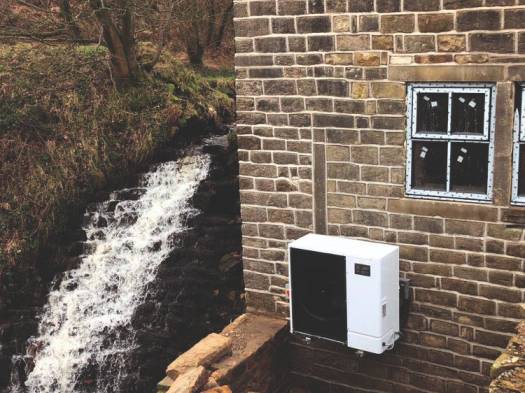Home heating: Why we must now consider the alternatives

Russell Dean, Residential Product Group Director at Mitsubishi Electric, says the question of how we heat our housing stock is now critical.
With 13% of the UK’s greenhouse gas emissions caused by domestic heating, it is vital that the government and wider industry come together to tackle how we heat our homes and businesses as we look towards net zero.
In the search for possible solutions to the heating challenge, a range of options need to be considered. While hydrogen has been labelled by some as a “silver bullet” solution, new research1 has found the fuel unsuitable for heating - instead advocating for heat pumps as a more efficient and cost-effective alternative.
It’s becoming increasingly clear that the renewable heating journey cannot be addressed by one solution alone. Only by adopting a holistic approach towards renewable heating, and considering a range of tried and tested alternatives, will we be able to deploy the right heating method for each building and decarbonise heating more effectively by 2050.
Hydrogen’s hidden impact
As we approach COP27, attention is again focusing on how we decarbonise the UK economy. As such, governments and authorities are now looking for the quickest and most cost-effective solutions. However, as recent research has shown, deploying hydrogen as the sole solution will only delay the switch to low-carbon heating further.
Despite now being widely considered an effective source of renewable energy, the actual production of hydrogen is often left out of ongoing conversations around heating. Hydrogen is extremely energy intensive to create and, in certain instances, can produce up to 20% more emissions2 than natural gas.
The production of hydrogen can be powered in several different ways, with grey hydrogen - the most common form – is created using natural gas without capturing the greenhouse gases emitted during the process. “Blue hydrogen” is a slightly more sustainable form, a method that captures and stores the carbon dioxide emitted during the production process. While stopping carbon from being emitted into the atmosphere, this method requires the producer to have adequate carbon capture and storage facilities.
Green hydrogen remains the most sustainable iteration, produced using clean electricity from renewable energy sources like solar and wind. However, battery storage technology can often be expensive to operate, likely pushing the government towards deploying blue hydrogen for home heating. This, however, still uses fossil fuels in its production-meaning the solution could slow the transition to net zero.
In order to meet ambitious climate targets set in place by the government, we cannot continue to view hydrogen as a one-size-fits-all solution to home heating. Rather, the UK now needs to consider other viable alternatives that can be rolled out rapidly at scale.
Introducing heat pump technology
As recent research has shown, other forms of renewable heating are already available looking to make the switch to low-carbon heating. For example, air source heat pumps (ASHP) have been widely recommended by the Committee on Climate Change, with the authority encouraging the installation of one million per annum by 2030.
Recent government funding 3 for innovation projects, which could make heat pumps easier and more cost-effective to install, suggest a growing awareness of the benefits that heat pump technology can bring. However, a significant amount of government and independent industry support is still needed in order for current installation targets to be met. Installers will require new training on heat pump technology, with organisations such as the Heat Pump Association4 having already begun training to support higher demand for heat pump technology.

Homeowners are being offered greater financial support for ‘green’ technologies, like the Boiler Upgrade Scheme (BUS) and Warmer Homes Programme, which offer grants to those looking to make energy efficient improvements to their homes.
A key question that often arises when attempting to tackle the decarbonisation of heating is what to do with buildings that are not connected to the gas grid. Heat pumps offer a highly efficient and effective solution for these ‘disconnected’ buildings, as they are both designed for retrofitting and do not require connection to the gas grid, making them strongly suited to older properties looking to transition to renewable heating.
However, that is not to say that hydrogen has no place in a low-carbon economy. Hydrogen has real potential as a sustainable alternative to gas, oil and petrol in some of the heavier industries such as shipping, aviation, agriculture and transport – all highly important areas that we need to decarbonise on our journey to net zero.
Considering the wider picture
It’s increasingly clear that the decarbonisation of a building’s heating will require more than one solution to help us achieve our goals. While a viable source for the more heavily polluting industries, the deployment of hydrogen as a sole solution for a building’s heating simply isn’t suitable in isolation. Only by considering the alternatives – such as heat pumps – and allowing a range of solutions to work alongside one another, can we decarbonise the UK’s building stock and reach net zero by 2050.
Source
1 https://tinyurl.com/35a5napm
2 https://tinyurl.com/3e35tb93
3 https://tinyurl.com/8su8n2ek
4 www.heatpumps.org.uk/transforming-britains-heating-vision-paper
Russell Dean is Residential Product Group Director at Mitsubishi Electric








